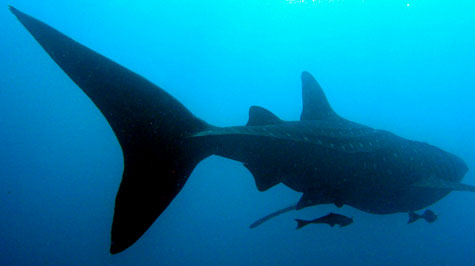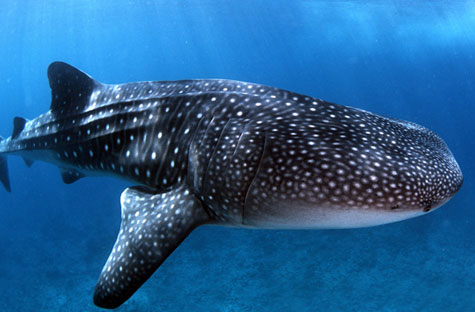LOCAL DIVERS RAISE CONCERN ON WHALE SHARK RESEARCH PROGRAMME
Local divers have raised concerns about a whale shark research programme being conducted in the Maldives by a UK charity. The divers say tagging of whale sharks in a Marine Protected Area near Maamigili island in South Ari Atoll – and an aggregation site for whale sharks – is causing whale sharks to abandon the area.
A local diver with 10 years experience of diving in the area told Bluepeace that whale sharks were spotted throughout the year at the site, but are hardly seen anymore because of the tagging.
The charity named ‘Maldives Whale Shark Research Programme’ (MWSRP) has been conducting research in the Maldives since 2006. According to the programme’s website the tagging project was launched in 2008.
MWSRP, on the other hand, has raised concerns about unregulated diving boats visiting the Marine Protected Area. In the programme’s website MWSRP wrote on 3 January 2010 that whale sharks are back in the South Ari Atoll but were facing threats from unregulated tourism.
“Unfortunately the reef is also busier than ever with the unregulated tourism that flocks to the whale shark ‘Hotspot’. Since the recent designation of the area as the largest MPA in the Maldives, nothing has changed, in fact it has inevitably become more busy, increasing habitat disturbance as a major threat to the animals. The tour industry have not been made aware of the rules or regulations within the MPA and boats (sometimes 10 at a time) consistently converge on any shark that is spotted. So the madness is set to continue until such times as the government makes the necessary communications with the stakeholders.â€
The research team, which is receiving assistance from the tourist resort Conrad Maldives Rangali Island, also takes tourists staying at the resort to the whale shark aggregation site, according to Easier Travel.
“The Conrad Maldives Rangali Island will once again provide support by giving the team accommodation on a local island, supplies, as well as diving equipment and the use of their boats. Guests at the resort will also be able to take part in the research by accompanying the team on their excursions to study the whale sharks, taking samples and measurements and assisting the team with their conservation work.â€
MWSRP’s website says it has been in touch with the government of the Maldives and the local community to develop the Marine Protected Area.
“The year 2009 has seen the successful development of South Ari Atoll’s MPA, which is on its way to becoming the first collaboratively managed and regulated, revenue generating MPA in the Maldives, ensuring the local community benefits from their natural resources whilst making tourism more sustainable. Resorts are already committing to sponsoring the initiative following consultations with the MWSRP.â€
Local divers are having a different opinion. They believe the tagging of whale sharks is driving the sharks away. They also raise questions about the methodology used in tagging and claim the use of spear guns by the research team is harming the whale sharks. In addition, local divers raise their concern that the authorities are not regulating the research.
A number of divers working on liveaboards, which take foreign tourists to the whale shark aggregation site, are disappointed with the research team conducting the research at the site during the peak tourist season. They claim that it is detrimental to their business as most of their clients come to the Maldives with the hope of spotting whale sharks. The peak tourist season also coincides with the arrival of North-east monsoon which brings more plankton to the area and attracts whale sharks. However, divers claim the number of whale sharks spotted in the area is significantly less this season. One prominent diver told Bluepeace that divers were not opposed to research in general, but were not happy with the research being carried out inside the Marine Protected Area.
Divers Association of Maldives is planning to raise the concerns of Maldivian divers with the relevant government authorities. Zoona Naseem, the President of DAM, told Bluepeace that the organisation was not opposed to whale shark research but their main concerns were the methodology used in tagging; lack of government regulation and monitoring of the research; and the concerns being raised by the divers that the number of whale sharks frequenting the Marine Protected Area is decreasing.
Maldivian divers also question whether the communities in South Ari Atoll have received any benefits from the research programme. They say MWSRP has not consulted the divers in the area and does not involve Maldivians in the research.


